|
|
|
Sort Order |
|
|
|
Items / Page
|
|
|
|
|
|
|
| Srl | Item |
| 1 |
ID:
139620
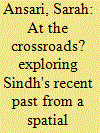

|
|
|
|
|
| Summary/Abstract |
This article explores Sindh, today a province in Pakistan, in terms of its spatial relationship with the various overlapping ‘worlds’ to which it has belonged in the recent past. Sindh's reputation under the British was as a sleepy backwater, located at a distance from centres of colonial power. But this simplistically static picture belies its relationship, for instance, with new communication and transportation links that connected it in different ways to places outside its immediate provincial boundaries, whether Indian, imperial or international. By the time of British India's independence, Sindh (and its port city of Karachi in particular) constituted a major crossroads: and while in the second half of the twentieth century it became more of a hub than it had ever been in its history, equally never before had so many people made it their final destination and home. This article, thus, traces the interconnected processes that, both before and since 1947, have helped to position, and arguably redefine, Sindh's place in the world.
|
|
|
|
|
|
|
|
|
|
|
|
|
|
|
|
| 2 |
ID:
122841
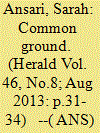

|
|
|
| 3 |
ID:
102053
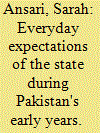

|
|
|
|
|
| Publication |
2011.
|
| Summary/Abstract |
Accessing the day-to-day, albeit pressing, concerns of Pakistanis in the early 1950s can be difficult as a result of the relative paucity of relevant primary material. One set of sources, however, are the letters written to the editors of contemporary newspapers during this period, in which correspondents outlined their expectations of, made demands on, and aired their frustrations with, the everyday state in the years following independence and Pakistan's creation. This paper draws on a sample of this correspondence on the letter pages of Dawn (Karachi) during 1950-1953 in order to explore the views of ordinary citizens as they grappled with problems of housing, transport, food rationing, water shortage, and corruption.
|
|
|
|
|
|
|
|
|
|
|
|
|
|
|
|
| 4 |
ID:
102035
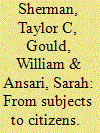

|
|
|
|
|
| Publication |
2011.
|
| Summary/Abstract |
This special issue of Modern Asian Studies explores the shift from colonial rule to independence in India and Pakistan, with the aim of unravelling the explicit meanings and relevance of 'independence' for the new citizens of India and Pakistan during the two decades after 1947. While the study of postcolonial South Asia has blossomed in recent years, this volume addresses a number of imbalances in this dynamic and highly popular field. Firstly, the histories of India and Pakistan after 1947 have come to be conceived separately, with many scholars assuming that the two states developed along divergent paths after independence. Thus, the dominant historical paradigm has been to examine either India or Pakistan in relative isolation from one another. While a handful of very recent books on the partition of the subcontinent have begun to study the two states simultaneously, very few of these new histories reach beyond the immediate concerns of partition. Of course, both countries developed out of much the same set of historical experiences. Viewing the two states in the same frame not only allows the contributors to this issue to explore common themes, it also facilitates an exploration of the powerful continuities between the pre- and post-independence periods.
|
|
|
|
|
|
|
|
|
|
|
|
|
|
|
|
| 5 |
ID:
067657
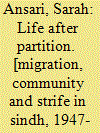

|
|
|
|
|
| Publication |
Karachi, Oxford University Press, 2005.
|
| Description |
xv, 240p.hbk
|
| Standard Number |
019597834X
|
|
|
|
|
|
|
|
|
|
|
|
Copies: C:1/I:0,R:0,Q:0
Circulation
| Accession# | Call# | Current Location | Status | Policy | Location |
| 050710 | 954.04/ANS 050710 | Main | On Shelf | General | |
|
|
|
|
| 6 |
ID:
149784
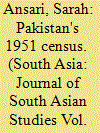

|
|
|
|
|
| Summary/Abstract |
This article explores the carrying out of Pakistan's first census in 1951 from the perspective of contemporary developments in the southern province of Sindh. Conducted against the backdrop of Partition-related migration to and from the province, this attempt at population enumeration proved to be a mammoth bureaucratic undertaking on the part of the recently-created Pakistani state. The challenges that this exercise posed at the provincial level shed light on processes of attempted nation-building as well as the centrality of population counting to the biopolitical management of citizenship during a key period of transition in mid twentieth-century Sindh.
|
|
|
|
|
|
|
|
|
|
|
|
|
|
|
|
| 7 |
ID:
140091
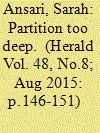

|
|
|
| 8 |
ID:
091664
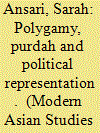

|
|
|
|
|
| Publication |
2009.
|
| Summary/Abstract |
Debates on Islam, citizenship and women's rights have been closely interconnected in Pakistan, from the time of the state's creation in 1947 through to the present day. This article explores the extent to which during the 1950s campaigns to reform Muslim personal law (which received a boost thanks to the outcry against 1955 polygamous marriage of the then Prime Minister, Muhammad Ali Bogra) were linked with wider lobbying by female activists to secure for women their rights as Pakistani citizens alongside men. Through a close examination of the discussions that were conducted on the pages of English-language newspapers, such as Dawn and the Pakistan Times, it highlights in particular what female contributors thought about issues that were affecting the lives of women in Pakistan during its early, and often challenging, nation-building years.
|
|
|
|
|
|
|
|
|
|
|
|
|
|
|
|
|
|
|
|
|